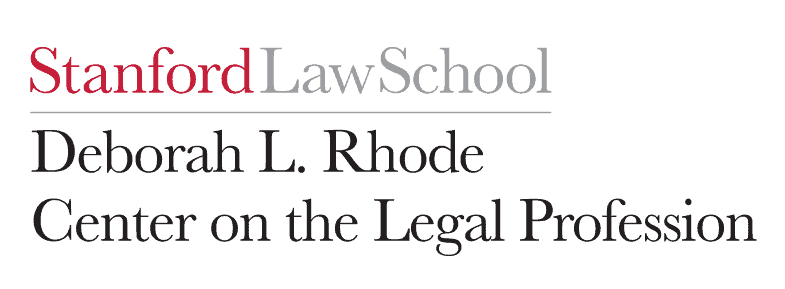The legal profession has long promoted a very particular understanding of “success” and the metrics we should use to measure it. An elite law degree, a prestigious clerkship, partnership at a big law firm. In our society, it is an image that historically has been most readily achieved by white males of high socioeconomic status who don’t have childcare responsibilities. Even as the profession has changed, and more women and people of color head to law school, at the highest, most prestigious levels, the diversity of the profession lags.
Inspired by Deborah Rhode’s book, Ambition: For What?, the Rhode Center on the Legal Profession recently hosted a panel that invited reflection on the themes of ambition, success, and the legal profession. Panelists Cassandra Knight, SLS ’94 and Vice President of Litigation and Discovery at Google, Leslie Hatamiya, SLS ’97 and Executive Director of the San Bruno Community Foundation, and Michelle Banks, former GAP Global General Counsel, discussed why the conventional image of success is often not achievable for people of color and women. But the panelists also invited further consideration of whether the conventional image is the right one, challenging attendees to reflect on what success means for them.
The panelists emphasized the structural and institutional barriers that make it hard for certain groups to obtain the traditional markers of “success” and offered a call to action for the profession to take definitive steps to address these barriers. Women and people of color continue to be underrepresented in firms, and especially in partnerships. Women of color, for example, account for 14% of associates, but only 5% of non-equity partners and 3% of equity partners. Knight suggested women and people of color often feel like outsiders in traditional legal organizations. She stressed the importance of having someone who supports you in the room, particularly for performance reviews and promotions, and noted that many women and people of color lack that support. By contrast, Hatamiya noted the presence of larger numbers of women in public sector lawyering makes it easier for women to find mentors. Part of what is missing, then, is community and mentorship.
The inflexibility of firm life also makes it hard for women who serve as primary caregivers to balance childcare responsibilities and lawyering. Banks and Knight suggested that this structural barrier would not change without intentional firm policy changes. Hatamiya suggested this structural inflexibility persists in the public sector too, where it is often brought on by court deadlines. Interestingly, each panelist noted this issue was currently relevant for her because of the need to care for aging parents.
The panelists described how their personal understanding of what success means for them has changed over time. Some of this change has come from intentional reflection at particular infection points. Hatamiya asked herself hard questions about what she wanted to do and how she wanted to spend her time. In turn, Hatamiya’s love of wrestling with difficult public policy questions led her down a less traditional lawyerly path. Similarly, Knight spoke about how being less wedded to a certain definition of success has made her open to the opportunities that have fallen into her lap.
The panelists also commented on how their sense of what success is for them has changed over time with more life experience. Banks emphasized that the most important question for her has become whether she is fulfilled by her work and her life more generally. Hatamiya and Knight spoke about how life experiences, such as getting married, having children, and caring for ailing parents have shifted their priorities.
